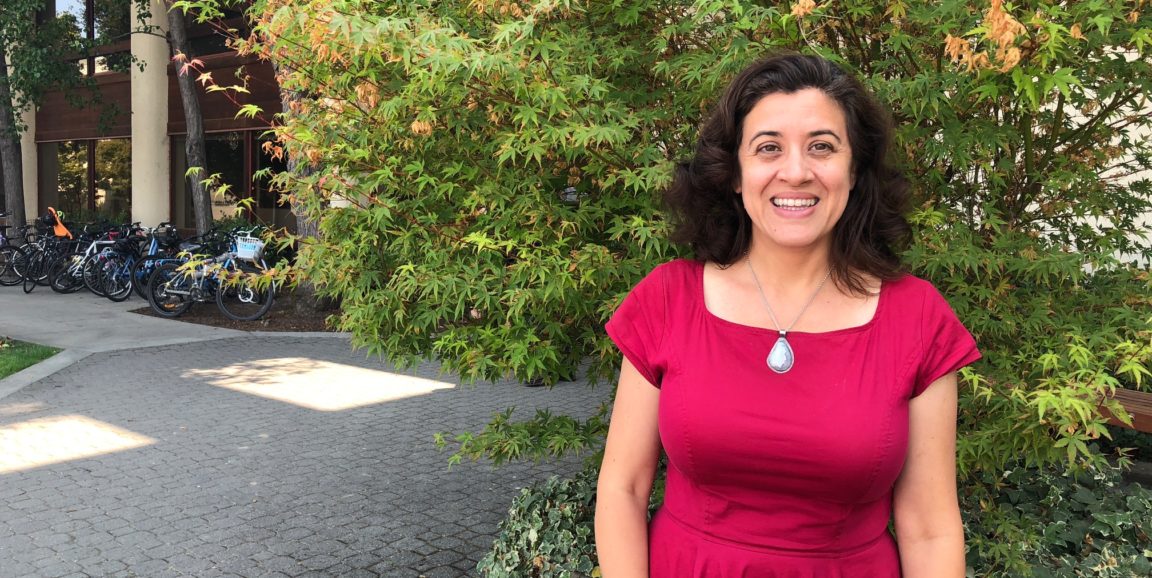The ever-evolving role of technology raises important questions about patient privacy, consent, and how digital health companies collect, store, and use data.
Nicole Martinez-Martin, PhD, JD, a postdoctoral fellow in biomedical ethics, is working to inject ethical principles into this intersection of technology and health. I sat down with her to learn more.
What brought you to Stanford?
Five years ago, I was hired as a bioethics teaching fellow for Thinking Matters, a required program of courses for Stanford undergraduate freshmen that stresses critical thinking through interdisciplinary courses.
Where are you from?
I grew up in Chicago. Stanford was the first time I lived outside the East Coast or Midwest. I even got my doctorate at University of Chicago and had a fellowship there in bioethics. I miss the architecture and all the amazing authentic Mexican food restaurants, but I really do love it out here.
Why did you go into biomedical ethics?
I started off with a law degree. I then set off to get my doctorate in social science in an interdisciplinary program.
It turned out that a lot of the things I was interested in were at the intersection of health, technology, and ethics. My first project was on the use of neuroscience in criminal courts. As I pursued it, people told me that these were the kind of topics explored in bioethics, so I began pursuing that field.
What are you working on today?
I'm looking at industry standards for digital phenotyping. Digital phenotyping is using information generally collected from smartphones, like taps or the rise and fall of your voice, used in order to make health assessments.
In the world of mental health, digital phenotyping provides a lot of opportunity and possibilities for improving diagnosis and treatment. But, there are still questions about how you properly protect people’s privacy, for example, or how you get consent. I’m part of a project aimed to develop guidelines and standards for the ethical use of this technology.
As part of my fellowship, I’m also getting trained on clinical ethics at the hospital. Some days, I’m starting to shadow in the hospital and learn more about the clinical aspect of bioethics.
What is the biggest challenge in your field right now?
AI and digital tech will really change the practice of medicine in a number of ways. So, the same old challenges of how do you respect the patient or the research subjects are still present, but these new technologies are beginning to change a lot of relationships in medicine, like doctor-patient or research-subject relationship.
What is most fulfilling about your work now?
I was crazy for science fiction as a kid. I loved looking at these ethical dilemmas that come up in society when new things are encountered. In that way, it’s really satisfying to be able to work on these dilemmas on a daily basis.
What is one piece of advice you would give to a future scientist?
Find the sort of puzzles and questions that really fascinate you — and follow them passionately. Find the thing that you really enjoy researching, that can also improve people’s understanding of how to go about medicine and science that is respectful but still digs into these amazing questions that we want to learn about.
How do you unwind?
I like cooking. My daughter, who just started kindergarten, has started to really like baking, so it’s fun seeing her pick projects and spend time baking with me. The other day, she wanted to make strawberry frosting, so that was fun.
Do you have a favorite scientist?
Marie Curie. A lot of it is from The Who Was? Show, which my kids were watching that does biographies of people from history. She attended a school called the Flying University, which was a sort of underground university since women weren’t able to study in her era. It showed such amazing determination and dedication.
Do you have any rituals or things to have or do before you can get into the mode to work?
Usually I give myself 5 or 10 minutes before I start to work to look at my goofy pop culture sites in order to get it out of my system.
What's your ultimate career goal?
My goal is to stay within academia as a bioethicist... and also to write a science fiction novel someday!
Photo by Roxanne Ohayon




